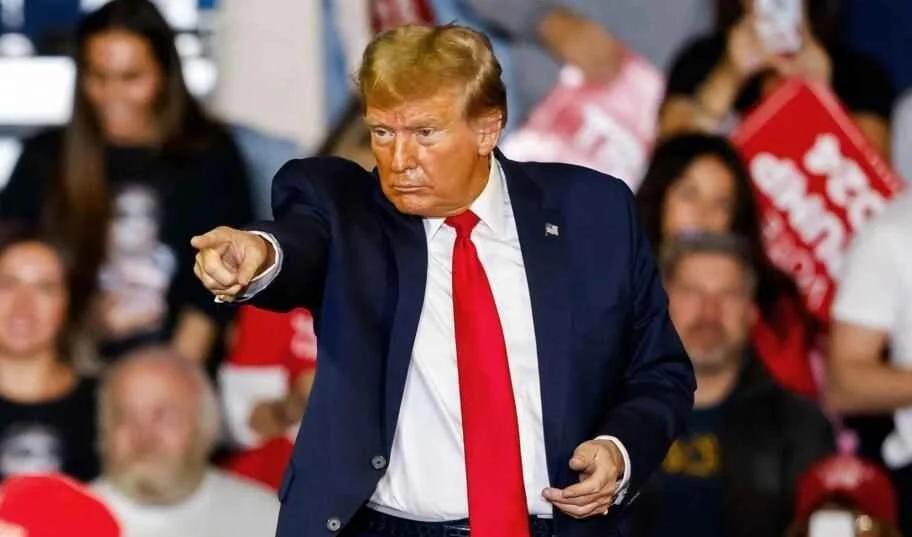
Former US President and 2024 presidential hopeful Donald Trump addresses supporters during a “Get Out the Vote” Rally in Conway, South Carolina, on February 10, 2024. Trump reiterates his firm stance on NATO defense spending, urging member countries to fulfill their financial obligations to avoid potential Russian aggression. IMAGE | COURTESY
In Summary:
1) Donald Trump emphasizes the urgency for NATO members to increase defense spending or face potential Russian aggression.
2) Trump advocates for stricter conditions on foreign aid, proposing loans instead of grants.
Feb 11 (TopNews) – In a recent speech in South Carolina, White House hopeful Donald Trump reiterated his firm stance on NATO defense spending, urging member countries to fulfill their financial obligations to avoid potential Russian aggression. He bluntly warned that failure to do so could leave NATO vulnerable.
Trump vividly recalled a confrontation with an unnamed NATO member, emphasizing his refusal to protect countries that fail to meet their defense spending targets.
He reiterated his stance, stating, “‘You didn’t pay? You’re delinquent?’… ‘No I would not protect you. In fact, I would encourage them to do whatever the hell they want. You gotta pay. You gotta pay your bills.’”
This bold statement reflects Trump’s unwavering commitment to holding NATO members accountable for their financial commitments and ensuring the alliance’s strength and cohesion.
Critics, including White House spokesperson Andrew Bates, swiftly condemned Trump’s remarks, denouncing the notion of encouraging Russian aggression against non-compliant NATO members. Bates emphasized, “Encouraging invasions of our closest allies by murderous regimes is appalling and unhinged – and it endangers American national security, global stability, and our economy at home.”
NATO Secretary-General Jens Stoltenberg echoed these sentiments, underlining the importance of solidarity among member states for collective security. Stoltenberg warned against undermining the alliance’s core principles, stating, “Any suggestion that allies will not defend each other undermines all of our security, including that of the US, and puts American and European soldiers at increased risk.”
Against the backdrop of ongoing tensions between Ukraine and Russia, Trump’s warning highlights the critical importance of NATO solidarity and preparedness in deterring potential threats.
Moreover, earlier on Saturday, Trump called for the end of foreign aid “without “strings” attached,” arguing that the U.S. should dramatically curtail the way it provides money.
“From this point forward, are you listening U.S. Senate(?), no money in the form of foreign aid should be given to any country unless it is done as a loan, not just a giveaway,” Trump wrote on his social media network.
He further suggested that the money could be loaned “on extraordinarily good terms,” with no interest and no date for repayment. However, he cautioned that “if the country we are helping ever turns against us, or strikes it rich sometime in the future, the loan will be paid off and the money returned to the United States.”
While Trump’s rhetoric may have influenced some NATO members to increase defense spending, many countries still fall short of meeting the 2% GDP obligation. The issue of defense spending and NATO’s role in ensuring trans-Atlantic security remains a pressing topic for debate and negotiation.
Video clip showing part of Trump’s speech: Former President Donald Trump asserts he urged a NATO ally to increase payments, cautioning against potential Russian aggression if dues were not met. Watch the video for Trump’s remarks.
In conclusion, Trump’s emphasis on NATO defense spending underscores broader concerns about international security and the imperative for allied cooperation in confronting emerging threats, particularly from Russia.
His recent calls for reform in foreign aid distribution, including the suggestion of providing loans instead of grants, reflect ongoing discussions and debates within the current political landscape.
As the Biden administration leads the nation, shaping U.S. foreign policy strategies, the ongoing debates surrounding defense spending and NATO’s role remain crucial topics for negotiation and collaboration among allied nations.
